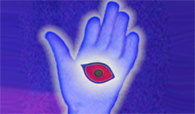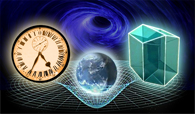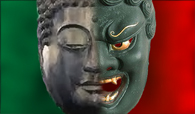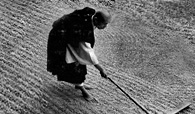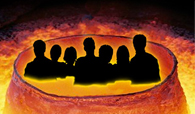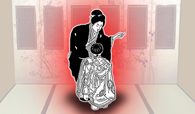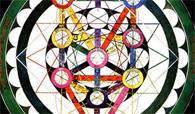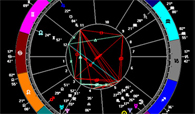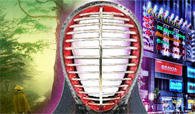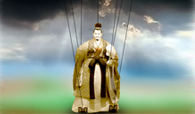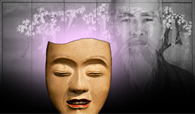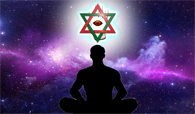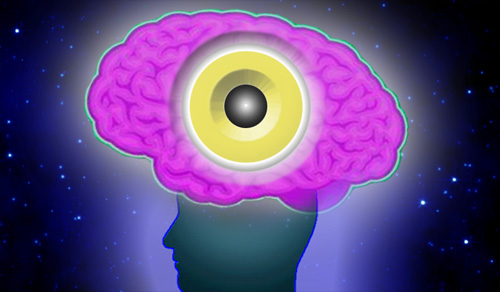
Kendo Nagasaki has much to say...
...about how the four planes of mind, body, soul, and spirit relate to each other.
People tend to think of the conscious, reasoning mind as the unique, intangible essence of their own “selves”, but it is not – there is much more to a person than that.
From a neuroscientific perspective, in the simplest terms the "mind" is really only a product of the neurons that collectively comprise the bulk of the brain, as well as the established neural pathways therein, constructed by learning. Moods, feelings, and attention can be observed within those structures as electro-chemical "clouds" of neurotransmitters which flow among the neurons and pathways. These physical aspects of neural structures and neurotransmitters are, of course, part of the body, and it can therefore be argued that much of the mind springs from the body. Arguably, because of its physical basis and the observable functioning structures, the mind is really a simple thing – a calculating device with which we deal with the elementary challenges that arise every day.
The property of "consciousness" is actually misnamed – unless it is worked at, most people never become fully conscious – they get through life on auto-pilot, in a largely unconscious way, never needing to examine themselves in a philosophical sense. Even if some self-analysis is done, it will tend to be in terms of external bodies of knowledge, such as the social norms they’ve been taught, the behaviour of their friends, the law, and their religion. There is nothing wrong with thinking according to these established bodies of knowledge – in fact, it is necessary for society to function – but people are never told – and therefore they never discover – that there is a great deal more to life than such a conditioned existence.
Those who have had a near-death experience know the difference between ordinary consciousness and real awareness. They have experienced something that was completely real and yet completely impossible to explain. Science can describe the process of brain death very eloquently, and in disarmingly simple biochemical terms, but philosophy comes to the rescue by reminding us that the objective observation of an event is not the same as the subjective experience of an event – my experience of my toothache is more urgently real to me than your description of yours!
This is where the revelations of meditation can make a huge difference to the abilities of a seeker of wisdom. Seekers of knowledge may accumulate a great deal of it, but that’s all they get – knowledge – merely a greater number of neural pathways with which to calculate a predictable answer to a rationalised question. They fail to realise that they may have killed the essence of the question by rationalising it, as opposed to looking to their intuition for an insightful, alternative perspective.
Intuition is a natural aspect of the soul – it is a connectedness with the wisdom of planes higher than incarnation, not limited by space or time or the human condition. Many people never experience what it is like to quieten the mind in meditation and be informed by their intuition, and it is a magical thing; it can be the basis of profound artistic inspiration, revelations of genuine uiversal truth can become available,it can give rise to astounding creativity, and guidance upon the most enlightened way to live seems to naturally flow. Accessing one's own intuition is one of the greatest resources available to humankind, and yet, in the west at least, it remains one of the least used.
It is said in ancient occultism that just as the body is the temple of the soul, the soul is the temple of the spirit, and consequently, the body must be looked after in order for the soul to be well, and the soul needs to be nurtured in order for the spirit to express itself effectively through it.
The spirit is pure creative wisdom – the principle of divinity that is the foundation of all creation, and of how the universe expresses itself. All mortals have souls, and therefore, they also have a spark of the divine spirit within them; it is a matter of synergistic balance, wellness, and discrimination that enables the body, the mind, the soul, and the spirit to all express themselves effectively, constructively, and creatively, in pursuit of the highest possible outcome of a whole life, or indeed responding to an individual karmic situation, or any single event.
To use a psychological analogy that bridges reductionistic thought and spiritual unfoldment, many of the karmic situations in an individual’s life exhibit a “demand characteristic” – they are almost predictable in how they may be expected to develop and resolve; it would only be by developing the discipline to still the mind and liberate the perspectives of the soul that one can understand the karmic implications of an event, and the inner meaning can be seen.
By following Kendo Nagasaki's Pathways to Power, you will have the benefit of Kendo's own specialised system which uses both traditional meditation techniques and advanced psychology to open the doors of your own inner awareness - you can make rapid progress towards full self-empowerment under the experienced and enlightened mentoring of the great sensei himself, Kendo Nagasaki, who stands as a fine example of empowerment through striking the right balance of mind, body, soul, and spirit.

